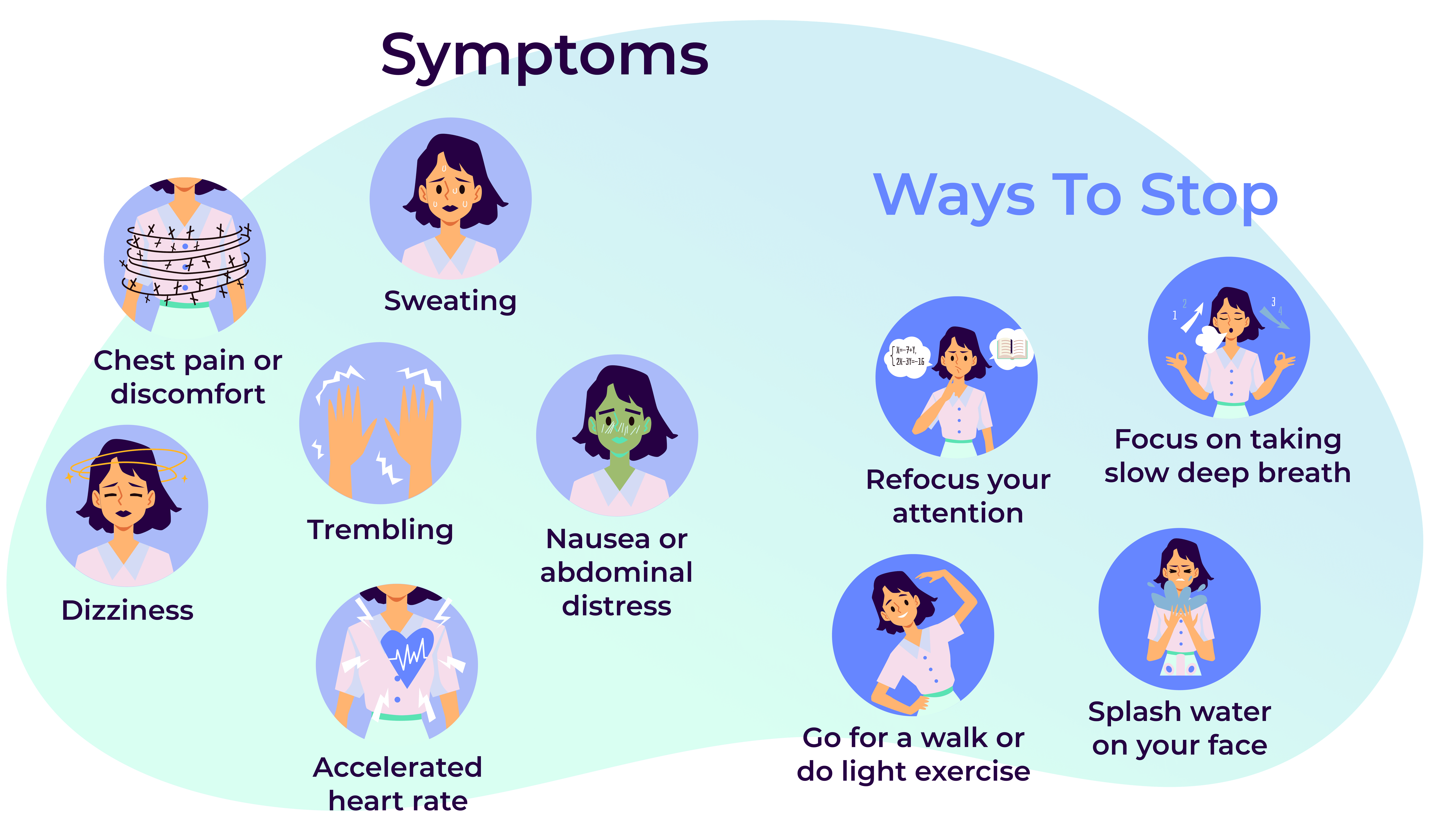Anxiety and Memory Loss
Do you often struggle to recall a recent conversation or the details of an important task? You might think it's just forgetfulness, but anxiety could be the cause.
Anxiety disorders affect millions of people worldwide, not just through its emotional toll but also by impairing cognitive functions like memory. Understanding how anxiety impacts memory can help you manage your symptoms of anxiety better and take proactive steps to improve your memory.
In this informational article, we'll explore how anxiety affects memory, discuss various types of anxiety-related memory loss, and outline strategies and treatment options that could help manage these effects. {MiniWidget:Anxiety} Types of anxiety-related memory loss Anxiety-related memory loss can manifest in various ways. Understanding these types can help in identifying the symptoms and seeking appropriate help. Short-term memory and anxiety Do you have trouble remembering things that happened recently? Anxiety can interfere with short-term memory by making it difficult to focus and concentrate on the present moment, leading to lapses in recalling recent events or information.
When your mind is preoccupied with worry, paying attention and retaining new information becomes harder. For example, you might forget where you placed your keys or miss important points in a meeting. Working memory and anxiety Working memory is crucial for tasks that require you to process and analyze information, such as problem-solving and decision-making. Anxiety can reduce the capacity of working memory, making it challenging to perform these tasks effectively.
If you find it hard to keep track of multiple tasks or struggle with mental arithmetic, anxiety might be impacting your working memory. This can make everyday tasks feel overwhelming and contribute to a cycle of stress and forgetfulness. Long-term memory and anxiety Long-term memory can also be affected by anxiety. The stress and distraction caused by anxiety can make it difficult to encode new information into your long-term memory and retrieve that stored information.
Chronic anxiety can interfere with the consolidation of memories, meaning you might struggle to remember events from your past. How anxiety affects memory Anxiety impacts various cognitive functions, with memory being particularly vulnerable. The brain's response to anxiety can alter how memories are formed, stored, and recalled.
This is primarily due to the body's stress response, which includes the release of cortisol and other stress hormones. These biochemical changes can hinder the processes necessary for effective memory retention and retrieval. How anxiety impacts the brain Anxiety can have several effects on the brain, which in turn impact memory: Overstimulation: When you experience anxiety, your brain is in a state of heightened arousal, which can lead to overstimulation. This overstimulation can interfere with the brain's ability to process and store information effectively, leading to memory problems. Heightened cortisol levels: Anxiety often results in elevated cortisol levels, a hormone released in response to stress. Chronic high cortisol levels can damage the hippocampus, the part of the brain responsible for forming new memories and retrieving old ones. Understanding these mechanisms can provide deeper insight into how anxiety disrupts memory. How anxiety affects memory formation and recall Anxiety can impact how our brain processes and stores information in the following ways: Short-term memory and anxiety: When you're anxious, your brain prioritizes immediate threats over other information. This means essential details and tasks can slip through the cracks, leading to gaps in your short-term memory. The constant state of alertness makes it challenging to focus on and remember recent events. Working memory and anxiety: Anxiety can also impact your ability to hold and manipulate information in your mind, making multitasking or following complex instructions particularly difficult. The mental clutter caused by anxiety can crowd out the information you need to retain. Long-term memory and anxiety: The stress hormones released during anxious episodes can interfere with the processes that consolidate memories, making it harder to build a robust memory bank. Anxiety can significantly disrupt short-term, working, and long-term memory, making everyday tasks and information retention more challenging.
However, you could improve your memory and overall cognitive function by recognizing these effects and implementing interventions like relaxation techniques, regular exercise, and seeking professional help. Other contributing factors In addition to the physiological impacts of anxiety on memory, some other factors can contribute to memory loss or challenges with recollection. Distracted thinking Anxiety often leads to distracted thinking, where your mind is preoccupied with worries and fears. This distracted thinking can disrupt the cognitive processes involved in memory formation, leading to forgetfulness and confusion. Stress-related fatigue Chronic anxiety can lead to physical and mental exhaustion, making it hard to focus and remember information. When you're constantly tired, your brain has to work harder to process information, which can further impair memory. Panic attacks and memory loss Panic attacks are intense episodes of fear that can cause physical anxiety symptoms like a racing heart, shortness of breath, and dizziness. During a panic attack, your brain's 'fight-or-flight' response activates and floods your body with stress hormones.
This acute stress can disrupt the functioning of the hippocampus, leading to temporary memory loss. People often report difficulty recalling details of their surroundings or what happened during a panic attack. Other potential causes of memory loss While anxiety can significantly impact memory, it's essential to consider other potential causes of memory loss, such as: Depression: Depression can also affect memory and cognitive function. Sleep disorders: Lack of sleep can impair memory and concentration. Medications: Certain medications can have side effects that impact memory. Medical conditions: Conditions like thyroid disorders, vitamin deficiencies, and neurological diseases can affect memory. If you're experiencing persistent memory issues, it's essential to consult with a healthcare professional for a comprehensive assessment. How to improve memory under stress There are strategies that can be used to improve memory and manage the stress caused by anxiety. Try relaxation techniques Relaxation techniques such as deep breathing, progressive muscle relaxation, and meditation can help reduce anxiety and improve your ability to concentrate and remember things. The goal of these practices is to help calm your mind, making it easier to focus and retain information. Increase exercise Regular physical activity can reduce anxiety and improve cognitive function. Exercise increases blood flow to the brain, promotes the growth of new neurons, and helps release endorphins, which can boost mood and mental performance. Improve sleep Quality sleep is crucial for memory consolidation. Anxiety can disrupt your sleep patterns, making it harder to get the rest you need. Establishing a regular sleep routine and creating a calming bedtime environment can help improve sleep quality and enhance memory. Try journaling Writing in a journal often benefits your mental health by helping you process emotions, organize thoughts, and reduce anxiety. Journaling can also serve as a tool for tracking your memory and identifying patterns or triggers that may be affecting your cognitive function. Try these memory strategies For some people, using certain strategies makes it easier to remember things by creating associations and breaking down complex information into manageable parts. Use mnemonics: Mnemonics are memory aids that help you remember information through association. Stay organized: Keeping a planner or to-do list can help you remember important tasks and appointments. Break tasks into smaller steps: Breaking tasks into smaller, manageable steps can make them less overwhelming and easier to remember. Visualization: Visualizing information or creating mental images can enhance memory retention by making abstract concepts more concrete. Chunking: Grouping information into smaller chunks can help you remember more by reducing cognitive load. For instance, breaking down long numbers into groups of three or four digits makes them easier to recall. Some may work better for you than others, so experiment and find out which techniques are most effective for improving your recall and cognitive function. Treatment options There are various treatment options available for managing anxiety and improving memory. Therapy Therapy is a highly effective treatment for anxiety and its impact on memory. Cognitive behavioral therapy (CBT) can help you identify and change negative thought patterns that contribute to anxiety. A licensed therapist in your state can also work with you to implement tools and strategies to manage anxiety and improve cognitive function. Medications Medications can be an effective part of anxiety treatment. Antidepressants, anti-anxiety medications, and beta-blockers are commonly prescribed to help manage anxiety symptoms. It's essential to work with a licensed provider to assess what treatment options might work for your specific needs. Taking proactive steps Anxiety can significantly impact memory, affecting both short-term and long-term recall. Understanding how anxiety influences memory and adopting strategies to manage it can help improve cognitive function.
Incorporating relaxation techniques, exercise, good sleep habits, and journaling into your routine could help you mitigate the effects of anxiety on your memory. Additionally, therapy and medication generally provide added support. Cerebral provides a convenient and accessible way to receive therapy, medication, and support for anxiety.
Remember: It's important to address anxiety and memory issues early to prevent them from interfering with daily life. Do I have anxiety? While only a licensed professional can make a diagnosis, if you’re asking yourself this question because you feel anxiety could be impacting your memory, you can get some initial insights before seeking a professional assessment.
Take our free 3-minute anxiety self-assessment to help you understand more about possible anxiety symptoms and their severity. Images by Drazen Zigic, katemangostar, and drrobotdean on Freepik.
*The information in this blog is provided as a general educational resource only, and is not to be used or relied on for any diagnostic or treatment purpose. This information should not be used as a substitute for professional diagnosis and treatment and does not create any patient-physician relationship between you and Cerebral. Please consult your health care provider before making any health care decisions or to get guidance about a specific medical condition.
Read more




